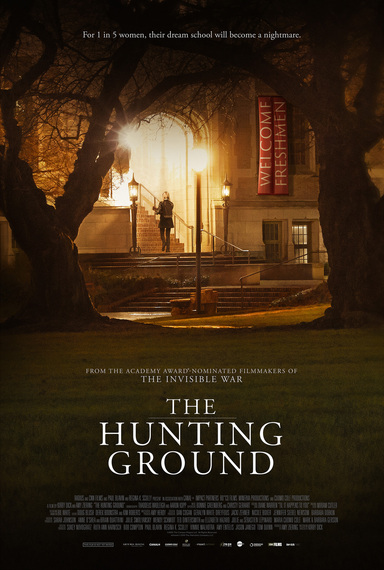"You are not alone." "It's not your fault." "We believe you." Those are the words Annie Clark and Andrea Pino encouraged attendees to share with victims of sexual assault on college campuses. These student advocates gave their advice during a panel session following a screening of The Hunting Ground.
This new film is raw, gripping and ridiculously honest about the challenges victims of sexual assault on campus may have to endure. In one scene we flat out hear that the treatment and aftermath of attempting to report such assaults is often times equally, if not more, traumatic than the assault itself.
Although it is a documentary, the style and stories are presented in a cinematic way that bravely and accurately depicts the horror of sexual assault through the eyes of various victims. Mostly women, but the movie also features men who have been victims of this epidemic.
So many brave and courageous stories; what struck me most was that victims would state "it happened to 20 girls on my campus" but the "20 girls" don't all step forward. It's seemingly only one or two that take on the battle in defense of those who maybe aren't ready to share or are afraid of the stigma or just want to try and put the experience behind them so they don't have to replay and revisit what happened. And can you blame them considering what we see revealed as the battle that awaits the brave? We see in the film sometimes it's not until what happens to them happens to other victims that they find the courage to be the voice of advocacy on their campus.
As the president of an organization focused on first- and second-year college students, the issue is of paramount concern. So many of the victims were assaulted before their first classes had even begun. As a mother, I want to do everything in my power not to be the parents featured in the film, whose heart-wrenching stories recount everything from disappointment, regret and outrage to downright grief when such trauma takes the ultimate toll.
We see victims vilified by their peers and their campuses. In the cases where an athlete is accused, you see this vilification by mainstream media. What on earth would make someone want to open themselves up to that? This film tells us what. The belief that right is right and that telling their stories is the only way anything will change.
One of the most staggering insights from the film is that 90 percent of sexual assaults are committed by 4 to 8 percent of the population. So it's especially these repeat offenders that need to be brought to justice. The film seems to lead us down the path that justice for these rapists is being expelled. But the post-screening panel said it best--justice is not rapists getting expelled, it's rapists going to jail. But that seems to be a battle on to itself.
The panel was moderated by Ashleigh Banfield of CNN; film director Kirby Dick and producer Amy Ziering also provided nights. U.S. Sen. Kirsten Gillibrand updated the audience on her important efforts to change the law to protect college victims.
Students in college need to see this movie. Students getting prepared to go to college need to see this movie. Parents need to see this movie. Faculty need to see this movie. Campus administrations need to see this movie. Everyone needs to see this movie. It is coming to New York, L.A. and D.C. to start. Organization screenings can be arranged.
We are bringing this movie to ScholarCon so that 2,000 high achieving students will have the opportunity to understand the magnitude of this epidemic and hopefully "dare" to find the courage to help.
Everyone can do something to be part of the solution. We can start with treating victims the right way by doing as Ms. Clark and Ms. Pino suggest, and simply saying: "You are not alone." "It's not your fault." "We believe you."

